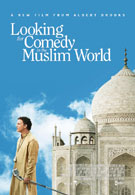Albert Brooks is becoming that kid in class who always seems ripe with potential, and then promptly fails the latest quiz. With Looking for Comedy in the Muslim World, the eccentric writer/director seemed to finally find a witty premise that he could turn into a remarkable movie. Instead, it winds up being just another disappointing effort full of missed opportunities.
Playing a satirical version of himself, Albert Brooks stars as an actor/comedian who is in a bit of a career slump. His meet-and-greet with Penny Marshall for a remake of Harvey goes poorly, and she insincerely praises his work in The In-Laws. Going home with his tail between his legs, he finds his wife buying more items they can’t afford on Ebay, and a letter sitting unopened on the counter from the Government Commission.
He is flown to Washington, D.C. and meets with actor/politician Fred Dalton Thompson and a political committee, who offer him an unusual assignment. Since 9/11 they only know about Muslims through spying or fighting, so they decide to try something new: learn who they are by what makes them laugh. Brooks is picked (after several higher profile comedians passed) to spend one month in India and Pakistan, and write a 500 page report about what they find entertaining. Something tells me this movie wouldn’t be one of those things.
The film takes a promising storyline and turns it into a redundant collection of failed jokes. While in India, Brooks is accompanied by two men from the state department (John Carroll Lynch and Jon Tenney), and an energetic assistant named Maya (Sheetal Sheth). Time and time again, the men prove themselves incompetent, and Maya misses all of Brooks’ jokes because she doesn’t understand sarcasm (and, oh yeah, nothing he says is remotely funny). Brooks walks around asking strangers what they find humorous with little luck, and then launches the first comedy concert in New Delhi.
The show is a disaster, and nothing he says gets even the smallest chuckle from the auditorium full of people. “Why is there no Halloween?” he asks the audience, “because they took away the Gandhi!” Silence ensues. It only gets worse when he pulls out a urinating puppet and tries to do a Ventriloquist act.
It quickly becomes clear that Brooks was the wrong comedian to send on this pretend assignment, and also the wrong man to do this movie. By deliberately being unfunny throughout the story, he never discovers what Muslims laugh about because they are given no real material, and that is the intention. The story is not about them, but rather a platform for Brooks to poke fun at himself arbitrarily. The humor is driven by watching his routines fall flat, and that grows tiring far quicker than he seems to realize. There are several jokes about how he will never be able to finish a report with 500 pages, how he is a C-list comedian, and how his claim to fame was voicing a fish in Finding Nemo. No wonder the only people laughing at him in the movie were high on weed.
Luckily, there are a few entertaining moments buried between the uncomfortable meetings and flopping jokes. Al Jazeera meets with him, asking him to star in a new sitcom about a Jew living in a Muslim Complex titled “That Darn Jew!” His reaction to this offer is hilarious, and indicative of the dry humor that has become Brooks’ trademark. The film desperately needs more of that, but is left high and dry. There is a speech Brooks offers to a character that sums up the movie perfectly: “In comedy,” he says, “some things work, and some don’t. You’re allowed to try and bomb.” And disappointingly, that’s exactly what he did.
Your Daily Blend of Entertainment News

